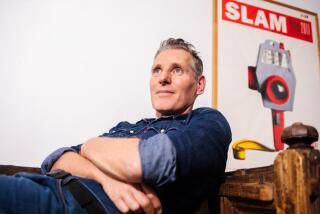COVER STORY : Lost in America : Alexander Godunov wanted to make it in the movies without drawing on his fame in ballet; now he’s another struggling actor
Madame Tatiana Riabouchinska-Lichine, 75, former principal dancer of the legendary Ballet Russe de Monte Carlo and now grande dame of the Lichine Ballet Academy in Beverly Hills, insists that Alexander Godunov--her very dear friend Sasha --wouldn’t hurt a fly.
She admits, however, that Godunov scares the kittens.
The Lichine Ballet Academy houses a wide assortment of cats; Godunov, former star of the Bolshoi Ballet, occasionally takes or teaches class there. The feline family includes a recent litter of kittens. “Mr. Alexander,” says Lichine, objected to giving the kittens away--but the ungrateful baby cats remain terrified of the 6-foot-3, deep-voiced Russian with the blond lion’s mane, and run when they see him coming. The kittens may have a point. Godunov is intimidating--at least at first. Meet him, for example, for an interview at the Sunset Strip headquarters of Electric Pictures--for whom Godunov recently completed his latest film, a “horror-comedy” called “Waxwork II: Lost in Time.”
Godunov greets a visitor politely enough, obligingly prowling the Electric Pictures suite for an empty office in which to talk. His representative graciously asks how long she might leave Godunov and his visitor alone. Perhaps an hour or so?
Godunov nods. Then shrugs. Then adds, darkly: “Or maybe five minutes.”
Dressed in a black leather jacket with zippered sleeves, a white sun visor, skin-tight jeans and a white shirt unbuttoned to just-above-navel baring a chest full of chains and a dangling Russian cross, Godunov lowers his long body into a chair. He lights a cigarette. This is good. Maybe the conversation will last as long as the cigarette.
But, after fretting slightly about his visitor’s tape recorder (“It makes your mind work less I think . . . actually, you don’t have to listen to me”), Godunov starts talking. The five-minute mark passes; more cigarettes are lit.
Kind of like “Waxwork II,” Godunov is scary, but both have a healthy sense of camp humor. Once a Bolshoi ballet legend whose dramatic defection from the Soviet Union made headlines, he is now just another struggling actor in Hollywood. In 1983, he started taking acting classes. And his first roles were promising: Peter Weir’s “Witness” and the original “Die Hard.” Unlike Mikhail Baryshnikov, who made his first splash in the movie world portraying a dancer (“The Turning Point”), it looked as if Godunov might make it as an actor without banking on his strength in dance.
But, Godunov has found, dance stardom doesn’t necessarily translate to Hollywood stardom. There have been no top roles since 1988’s “Die Hard;” Godunov says he does not receive scripts that satisfy him. His publicist tells a different story: She says Godunov’s lack of work results from his refusal to play the Hollywood game. His intimidating personality has led to clashes with Hollywood agents; now he doesn’t have one at all. She adds that he turns down parts in big-budget films with frustrating regularity, considering unorthodox roles in less prestigious films, or taking projects due to personal loyalties and friendships instead of weighing their value as career moves.
Such a friendship led to his current part as the diabolic ruler of an 18th-Century English castle in “Waxwork II”--the sequel to a cult horror movie about a wax museum and its evil inhabitants. But he’s kept a mordant sense of humor about it. “Forty-one--getting older in America,” he says with mock despair.
“I am still waiting for next film,” says Godunov; he finished “Waxwork II” June 30. His accent, after 12 years in the United States, remains thick. “How long I will wait, I don’t know.
“It’s very difficult, because you say ‘No’ and the next morning you say: ‘Oh, no, I should have said yes!’ Because I want to work, that’s where you learn. But so far, a few films I said no to, I blessed myself that I wasn’t in them. It’s a tricky game.”
“Waxwork II”--a low-budget (about $3 million) film targeted for a cult audience, is described like this: “The wax museum burns furiously, as Mark and Sarah run from the Flaming Behemouth. The Waxwork and the evil inhabitants have finally been destroyed . . . or have they? A severed hand, lone survivor of the wreckage, crawls painfully from the rubble. . . .”
To reveal the hand’s intentions would spoil the tale (eventual fate: garbage disposal). Instead, the story of how Godunov went from ballet to the movies:
When Godunov was 9, his mother took him to the Bolshoi School. Out of about 250 applicants, they selected 13; one of them was Godunov. At 19, he joined the Bolshoi Ballet. Though most young dancers start out in minor roles, Godunov says simply, “My first role was prince in Swan Lake.”
After defecting from Russia in 1979, Godunov’s luck remained equally good: within six weeks, he had landed a spot as principal dancer with American Ballet Theatre. It didn’t last. In 1982, ABT artistic director Mikhail Baryshnikov abruptly fired Godunov. The official company statement said that Godunov’s repertory was too limited, and that the financially strapped company could not afford the dancer’s $5,500-a-week salary. Godunov, stung by the dismissal, went public with his anger, complaining to the press that “they threw me away like a potato peel.”
The firing did not end his dance career, however. In the next few years, Godunov performed as a guest artist with various companies as well as organizing his own temporary troupes for tours, including one show called “Godunov and Stars.”
During the mid-1980s, Godunov’s movie career began--and his dance career ended. In 1984, Godunov was preparing to leave on a summer dance tour of South America and Europe that he had organized. He was packing his bags when a phone call informed him that money problems in South America had scuttled the tour. Luckily, the next day he got another phone call--from the casting office of Australian director Peter Weir, offering him the part of a dour Amish farmer in Weir’s 1985 film “Witness.” Weir had been impressed by Godunov after watching the 1983 PBS special “Godunov: The World to Dance In.”
“They set up for me to have breakfast the next morning with Peter Weir,” Godunov says. “So through all this, I am sitting trembling-- thinking, now, he is going to ask me to read the lines. How, I have no idea. This is a big failure, bye-bye, nice talking to you.”
Weir did not ask Godunov to read the lines. At the end of the breakfast, he simply told Godunov: “See you in Pennsylvania.” Godunov asked for a screen test. You don’t understand, Weir told Godunov. You don’t need a screen test. You’ve got the part. Doggedly, Godunov once again asked for a screen test.
“I believe the casting lady fell off the couch when she heard that: ‘The guy got part, he’s asking for screen test?”’ Godunov says. “Well, I wasn’t thinking that way. For me, it was like the discipline from ballet. You practice, practice, practice. You may have danced the role for months and months, but you still have to go through the same routine, every morning, the same exercises. I just wanted to be in front of the camera.”
Godunov got his screen test (“I was nervous to death”) as well as the part.
Godunov picked up his dance career briefly after “Witness”-- but ended it abruptly. He does not remember the place or the exact date; his publicist of 10 years, Evelyn Shriver, thinks it happened in Detroit in 1984. But somewhere, after a concert, Godunov remembers saying to his then-companion Jacqueline Bisset: “You saw my last performance.”
Godunov had begun studying acting in L.A. a year earlier. He admits his grand Bolshoi theatricality didn’t cut with his acting teachers, Bill Taylor and Peggy Furie. “I have danced princes in ‘Ivan the Terrible,’ all kinds of characters . . . but it’s a hell of a difference,” he says. “I probably feel more comfortable than someone who was not on the stage ever, but still, you have to do it with your voice, rather than with your body.”
Acting class apparently worked well enough: Godunov soon landed other roles. In 1986, he portrayed a comically arrogant symphony conductor in “The Money Pit.” And, in 1988, Godunov played one of the very bad guys in the box-office smash “Die Hard.”
“Waxwork II” writer and director Anthony Hickox remains surprised that Godunov, who turned down the role of Dracula in the original “Waxwork,” accepted a part in the sequel. Godunov had also turned down a part in Hickox’s film “Sundown.”
Hickox describes Godunov’s role in “Waxwork II” as a “tormented soul who is in love with his own sister and descends into his own madness.” “Probably his agent and everybody else gave him a hard time about it, and said: ‘What, are you crazy? You do ‘Die Hard,’ and then you do ‘Waxwork II?’ “ Hickox imitates the appropriate level of agent-ly disgust.
Between “Die Hard” and “Waxwork II,” Godunov has done only one other film: “Runestone,” produced last year by Hyperion. It has not been released.
Godunov knows he might be in a different place in his career had he remained a dancer. He knows he might even be somewhere different had he chosen to do what his former fellow student at the Bolshoi, Mikhail Baryshnikov, did: star in dance films such as “The Turning Point” and “White Nights”--though Baryshnikov’s latest role is not as a dancer but as a KGB agent in MGM/Pathe’s “Company Business,” which opened Friday.
But Godunov decided a long time ago that he didn’t want to get into the movies on his strength as a dancer.
“I had offers to play dancers, defectors, whatever--my own story,” Godunov says. “It was actually before ‘Witness.’ But . . . I didn’t want to do it. I’m not saying that ballet movies are bad and shouldn’t be done. But my personal feeling about me is that I don’t want to mix this up. And I thought I would probably dominate stories about ballet with my ability in ballet. So I stayed away.” He laughs. “And now, it’s too late for me! But I wouldn’t do it anyway.
“That’s your life--you decide. Nobody forced me to stop dancing. I found myself saying: ‘I don’t want to do this anymore.’ I had a wonderful life, I had a great time in ballet, but I found myself onstage dancing and not liking it. It’s done, it’s finished. If I want to do movies, I told myself, go now, instead of waiting for someday something to happen. So far, I’ve been lucky--I’ve been in good films, and I’ve worked with good people. And that probably is luck, because you can’t see everything by reading the script.”
Godunov has a business manager, Arlene Medann, but no agent. He was most recently represented by Harris & Goldberg but terminated that relationship in 1990. He’s a hard guy to track down. Lichine says a producer at Paramount, unable to find Godunov through traditional channels, recently called the dance academy hunting for the elusive performer.
Shriver, who became Godunov’s publicist during the days just after his defection in New York, later moved to Nashville, where her clientele has switched from Russian dance defectors to country music stars. Godunov, she says, has remained with her despite the geographical distance.
Shriver acknowledges that Godunov has had a hard time maintaining working relationships with agents in Los Angeles. “Most people think they would like associating with someone as flamboyant and powerful as Alexander Godunov--but in reality, agents don’t know how to deal with him,” she says. “You know, it’s a strange thing to say about dancers who come from a country that is completely consumed by communism, but they have a very imperial air. I think they’ve danced one too many princes, you know?”
Shriver adds that she and Medann have watched in horror as Godunov tossed aside lucrative parts in recent years. She said Godunov receives between 10 and 12 “high-profile” movie offers per year. He rarely takes them.
“I don’t think he will tell you what roles he’s turned down . . . some of them were big-deal movies in the intention, but they didn’t do that well,” Shriver says. “And he’s very weird--he doesn’t like to insult anybody, rude as he can be sometimes, so I don’t think he’d mention them.
“But his instincts are always very right. He won’t just grab at something, he’ll say: ‘What’s the point of the movie, what does it mean?’ And I’m saying: ‘Who cares what it means? How often does a movie mean anything? Just take it!’ ” Shriver exclaims. “You’d think at this point in his career he would panic--but no. He doesn’t think he has the luxury of grabbing just anything. “The ‘Waxwork’ thing--in all honesty, I don’t remember ‘Waxwork I,’ much less ‘II.’ But he knows the director or producer or someone. Basically we were just applauding the fact that he was taking anything . From the point of view of the publicist, if you are not out there every year or two, the world will forget you.”
Godunov just shrugs when asked why he is making this unorthodox career move. “You could say, yeah, you feel more secure with a big-budget film, with big studios and big stars behind it,” he says. “But, you know, I liked the part that Anthony showed me--that’s why I said yes. If I didn’t like it, I would have said no, whether it’s a big film or a small film.”
Godunov also says he was eager to break the “Die Hard” mold. “Let me tell you about typecasting,” he deadpans. “After ‘Die Hard,’ obviously, I am offered to play bad guys. I had a (script) treatment to read, and I called back to say, ‘But this doesn’t say anything about my character.’ And they said: ‘Oh, you are going to wear a long black coat, and you will walk into a restaurant and you will pull out of your pocket a gun machine and shoot half of them.
“And the person says: ‘And, Alexander, please don’t forget--keep the same expression on your face from ‘Die Hard.’ ”
Godunov turned down the part--along with all the Amish farmers and insufferable orchestra conductors he was offered after his first two films.
Hickox, who also starred in the 1989 sci-fi sendup “Lobster Men From Mars,” first met Godunov several years ago at a favorite, now-gone Melrose hangout, La Pastaria. Unlike other directors, he did not see Godunov as a super-villain after “Die Hard.” “I have always pictured Alexander as a more heroic character,” Hickox says.
“He’s an original; there’s only one Alexander. But every great movie star has to be like that, so they stand out in a crowd.”
Hickox has recovered nicely from the barrage of bad reviews for 1988’s “Waxwork” (“too much waxy buildup,” said the Los Angeles Times). He remains hopeful that “Waxworks II,” originally slated to be released around Halloween, but now with an unscheduled release date, will score better with the critics.
“It’s kind of horrible when people hate your movie, and you’re not sure why,” Hickox says pleasantly. “It (“Waxwork”) was never a great movie, but it was my first, and it was original. We never tried to copy anybody else, we just tried to do our thing.”
Godunov’s frankness about the difficulties of establishing a film career makes it easy to forget there was a time when his entire life was a photo opportunity, his every move grist for the gossip mill. His 1979 defection during a Bolshoi U.S. tour--complete with a dramatic stand-off at Kennedy Airport during which his wife, Bolshoi dancer Ludmila Vlasova, made the decision to return to Russia without him--took place in a blaze of flashbulbs. The couple divorced in 1982.
The spotlight shone still brighter on his mid-1980s romance with actress Jacqueline Bisset, when articles referred to “the torrid twosome” and paparazzi happily chased the provocatively dressed couple around the party circuit.
“You get used to (inaccurate publicity)--you ignore it or you have fun with it, because that’s the way it is, you cannot escape it,” Godunov says.
Godunov broke up with Bisset three years ago; they remain friends. What split them up? “Life,” Godunov says. He remains philosophical about the havoc wreaked on his reputation during their days together. “It’s been written so much, about this and that, so I guess it’s just pointless trying to correct anything--besides, who is going to believe?” Godunov says now, with a shrug. “So let it be. I’m not hiding--you have to go and live. Otherwise, if you begin to lock doors, you find yourself completely alone.”
Not locking the doors is one thing; handing out the address is another. Despite his familiarity with media intrusion, there remains a startling naivete to Godunov. Asked about his current life in Los Angeles, Godunov obediently replies: “I live right here, in--” and gives the name of his apartment building in the West Hollywood foothills. Is this a mating call to the paparazzi , or a lunch invitation to the entire readership of The Times?
But it is this very naivete, say Lichine, Hickox and others familiar with Godunov, that endears Godunov to his friends.
“He is a very nice person,” insists Lichine. “(Mikhail) Baryshnikov came here once, too--he was rehearsing here, and I met him a little. Baryshnikov is rather, you know . . . .” Lichine lifts her nose high in the air. “I do not like to say bad things,” she adds apologetically. “But Sasha, no--it is completely different. He is very simple. He plays with the children here.”
Says Hickox: “I would expect he is a much nicer, more genuine person than he is perceived by the press. They probably are a little suspicious of him, because he is a Russian and this is America. But, actually, he could be from Wyoming--he just has this accent.”
And, adds Hickox, there are certain facets of the Godunov package over which the actor has no control. “It was very funny--we were sitting in a restaurant, and he was wearing a pair of shorts, right? And these two women are sitting next to him, kind of eyeing him. And when he stood up, one of the women actually screamed because he was wearing shorts. I don’t think he realizes it, quite.”
A former student of the Lichine Ballet Academy who occasionally took class with Godunov said Godunov’s reputation for arrogance stems from his basic incompatibility with the Hollywood scene. “He really doesn’t belong in Hollywood,” she says. “When he’s in the studio, he’s a really nice guy--when he’s dealing with Tania (Lichine) and the other ballet people. I really don’t get from him that arrogance--it’s when he gets into an arena where he’s unsure of himself that he turns it on.”
Not that Godunov is completely unaware of a certain degree of physical magnetism; Lichine and the ballet student both acknowledge that Godunov sometimes flirts rather shamelessly with adult students at the Lichine academy, and they flirt even more shamelessly back. “I used to take class with him, the morning class . . . he is so physical when he moves, he is so much like a male animal that he is totally arresting--the whole place would come to a complete stop,” the student says.
And, she adds: “A lot of people in the ballet world feel that, in ballet, he is masterful, he really is something--he could have been a huge star. Going into acting . . . a lot of people feel sad for him because he made the wrong choice. When he was with (Bisset), someone so famous and so beautiful, he had a place in Hollywood. Where is he now?”
Because of the recent coup attempt in Russia, Godunov has had more reason to think back to his early years as a dancer there recently. And the family ties remain; his mother and brother live in Riga, Latvia. Due to jammed phone lines, he says he was unable to reach them during the event, nor have they spoken since.
“It will be nice if both superpowers would now give their--whatever you call it--the keys to their nuclear weapons to the United Nations,” Godunov says. “But unfortunately, the Russians will always keep a spare key.”
Godunov remains optimistic, however. “You know, we talk about democracy (in the United States) on a different level--but (the Soviet Union has become) a democracy in that people can say what they want without being punished. It’s a big step for Russian people. It means a lot. I hope everything will work out, but it’s going to take time.” He laughs. “It’s like the movie business. I’d like to do another film right now--but I can’t.”
Occasionally, Godunov misses the surety that ballet afforded him for many years. “At (the Bolshoi School), if you are not good, if something happens to your body and you become fat or whatever, you are out. So after school, you are a professional dancer. You may not be a star, but you can work anywhere.
“But in acting, wherever you go, Paris, London, Los Angeles-- especially Los Angeles--almost everyone is an actor,” Godunov muses. “Whether you are driving a cab or you are a waiter, the bottom line is that you are an actor, waiting for a job. Meaning that the doors are open to anyone. Doesn’t mean you will get through.”
More to Read
Only good movies
Get the Indie Focus newsletter, Mark Olsen's weekly guide to the world of cinema.
You may occasionally receive promotional content from the Los Angeles Times.






